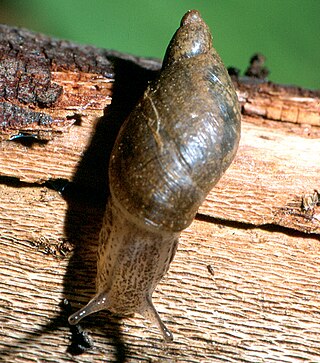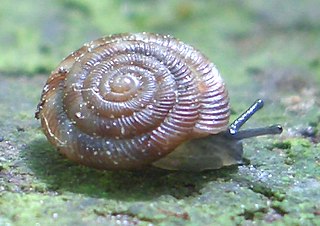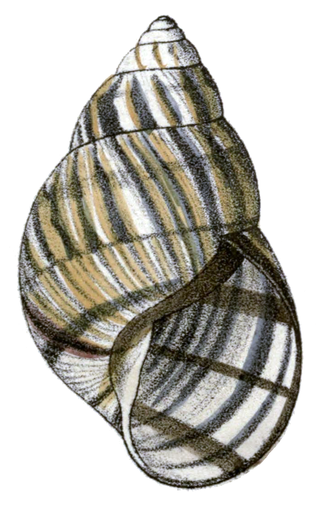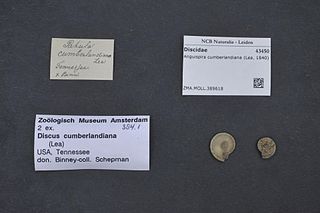
The Great Smoky Mountains are a mountain range rising along the Tennessee–North Carolina border in the southeastern United States. They are a subrange of the Appalachian Mountains and form part of the Blue Ridge Physiographic Province. The range is sometimes called the Smoky Mountains, and the name is commonly shortened to the Smokies. The Smokies are best known as the home of the Great Smoky Mountains National Park, which protects most of the range. The park was established in 1934 and, with over 11 million visits per year, is the most visited national park in the United States.

The Kanab ambersnail, formerly classified as Oxyloma haydeni kanabense or Oxyloma kanabense, is a small, air-breathing land snail belonging to the family Succineidae, the ambersnails. This terrestrial pulmonate gastropod mollusc was previously considered a critically endangered subspecies or species. In 2013, a scientific investigations report by the United States Geological Survey concluded that the Kanab ambersnail is not a genetically distinct species. In June 2021, the Fish and Wildlife Service removed the Kanab ambersnail from the United States Fish and Wildlife Service list of endangered mammals and birds and classified it with other common ambersnails within the same taxa, officially negating its status as a distinct subspecies.

Henry Augustus Pilsbry was an American biologist, malacologist and carcinologist, among other areas of study. He was a dominant presence in many fields of invertebrate taxonomy for the better part of a century. For much of his career, his authority with respect to the classification of certain substantial groups of organisms was unchallenged: barnacles, chitons, North American terrestrial mollusks, and others.

Discus is a genus of small air-breathing land snails, terrestrial pulmonate gastropod mollusks in the family Discidae, the disk snails.

Anguispira picta, common names painted snake-coiled forest snail and painted tigersnail, is a rare species of air-breathing land snail, a terrestrial pulmonate gastropod mollusk in the family Discidae, the disc snails. It is a limestone specialist, and is limited to outcrops with suitable mineralogy.

Anguispira, the tigersnails, is a genus of small pulmonate land snails in the family Discidae endemic to North America. Snails in this genus are defined by their striped shells. Anguispira species are either habitat generalists like A. alternata or limestone specialists like A. cumberlandiana.

The Chittenango ovate amber snail is a species of small air-breathing land snail in the family Succineidae, the amber snails. This species was discovered in 1905, and was reported three years later as a subspecies of the oval ambersnail, Succinea ovalis. Several taxonomic reviews took place in the subsequent decades until the end of the 1980s, when the Chittenango ovate amber snail was finally judged to be a distinct species based on chemical and morphological data.

Discidae is a taxonomic family of small air-breathing land snails, terrestrial gastropod mollusks in the superfamily Punctoidea.

Anguispira alternata, common name the flamed disc or flamed tigersnail, is a species of air-breathing land snail, a terrestrial pulmonate gastropod mollusk in the family Discidae, the disk snails. Flamed discs are medium-sized snails, with shells ranging from 17 to 25 millimeters in diameter. They are found around logs, hollow trees, and rocks in wooded areas throughout eastern North America, ranging from New Brunswick, Canada, south to northern Florida, and west to northeastern Texas, Kansas and western Minnesota. Flamed disks are herbivores that feed on decaying plant material, fungi, and algae.

Orthalicus reses, the Stock Island tree snail or the Florida tree snail, is a species of large tropical air-breathing tree snail, a terrestrial pulmonate gastropod mollusk in the family Orthalicidae. It was first described in 1830 by the American naturalist Thomas Say. The holotype, a specimen probably collected in Key West, was subsequently lost. Over a hundred years later, in 1946, the American biologist Henry Augustus Pilsbry redescribed the species using a specimen from Stock Island, Florida. Orthalicus reses has two subspecies, O. reses reses and O. reses nosodryas. The validity of these two taxa is still being discussed, but some experts argue that considering them as independent units may be important for management purposes.

The Socorro springsnail, scientific name Pyrgulopsis neomexicana, is an endangered species of minute freshwater snail with a gill and an operculum, an aquatic gastropod mollusk or micromollusk in the family Hydrobiidae, the mud snails.

Anguispira cumberlandiana, the Cumberland tigersnail or the Cumberland disc, is a range-restricted species of land snail; a terrestrial pulmonate gastropod mollusc in the family Discidae. They possess a lens shaped shell with convex whorls and a pinched, serrated keel. The shell is typically pale olive or tan in color, with radiating chestnut stripes and oblique radial streaks. This species is found in a few counties in Alabama and Tennessee along the Cumberland Plateau in the United States.

Amphidromus perversus is a species of air-breathing land snail, a terrestrial pulmonate gastropod mollusc in the family Camaenidae.

Anguispira kochi, the banded tigersnail, is a species of pulmonate terrestrial gastropod belonging to the family Discidae, the disk snails. There are two recognized subspecies: Anguispira kochi kochi or the eastern banded tigersnail, and Anguispira kochi occidentalis, the western banded tigersnail.
Anguispira alabama, also known as the Alabama tigersnail or Alabama disc, is a rare, range-restricted species of pulmonate land snail found in Alabama and Tennessee. Due to its rarity and the difficulty of locating new populations, the species is listed as vulnerable in both states.
Anguispira jessica, also known as the mountain tigersnail or mountain disc, is a species of pulmonate land snail– a gastropod mollusk in the family Discidae, the disk snails. The species is named after G.M. Kutchka's wife Jessica; he was the first to describe the species in 1938. It was originally considered a subspecies of Angusipira alternata, but has since been elevated to species status.

Anguispira fergusoni, also known as the coastal plain tigersnail or coastal plain disk, is a species of pulmonate land snail in the family Discidae, the disk snails. It is found in multiple states along the east coast of the United States.
Anguispira nimapuna, also known as the nimapuna or nimapu tigersnail, is a rare, range-restricted species of pulmonate land snail endemic to north-central Idaho. The species is listed as critically endangered in the United States.













